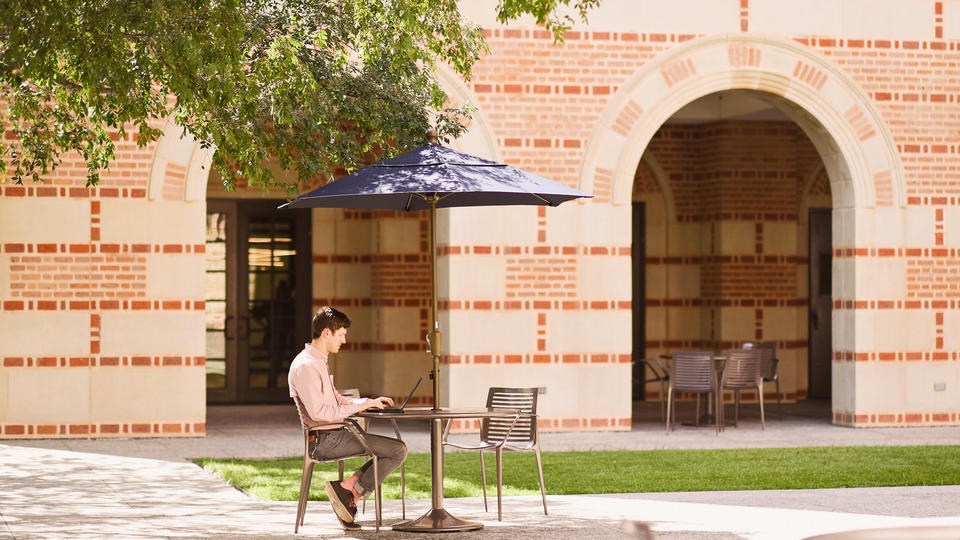
H-E-B dominates Austin-area grocery stores
Rice Business marketing professor Utpal Dholokia tells Axios that H-E-B's high market share shows that Austin shoppers value the grocer and are willing to give a sizable chunk of their dollars to the company.

Study: Conservative customers are more satisfied than liberal ones
"Consistently, results showed that conservatives are more satisfied than liberals with the products and services they purchased. This is profoundly important for companies and businesses whose goal is to provide customer value by satisfying their customers," said study co-author Vikas Mittal, a marketing professor at Rice Business.

Conservative customers are more satisfied than liberal ones, according to new study
Across industries, conservatives are more satisfied than liberals with the products and services they consume, according to a study of more than 326,000 U.S. consumers by an international research team including Vikas Mittal, professor of marketing at Rice Business.


Across industries, conservatives are more satisfied than liberals with the products and services they consume, according to a study of more than 326,000 U.S. consumers by an international research team from Rice University, the Catholic University of Portugal, Boston College, the University of Texas at San Antonio and Korea University.
The researchers examined ratings from 326,532 customers in different industries --industrial goods, restaurants, educational videos and health insurance. “Consistently, results showed that conservatives are more satisfied than liberals with the products and services they purchased. This is profoundly important for companies and businesses whose goal is to provide customer value by satisfying their customers,” said study co-author Vikas Mittal, a professor of marketing at Rice's Jones Graduate School of Business.

Cultivating a base of satisfied customers is the holy grail for any successful business, the researchers said. A 2021 study by Mittal found that a 1-point increase on a 7-point scale measuring satisfaction resulted in 12% sales growth for firms. Satisfied customers help businesses grow sales through greater repeat purchases, increased positive word of mouth, more recommendations to friends and family and fewer complaints, Mittal said. When customers are more satisfied, they are also more likely to promote the company’s brand on social media, he said.
For every customer, the team measured political identity and customer satisfaction. They measured political identity in different ways: asking consumers to share the political party they supported, their past voting behavior, their self-ratings on the liberal-conservative spectrum and whether they watch CNN/MSNBC or Fox for news. Customers rated their satisfaction on a scale ranging from “completely dissatisfied” to “completely satisfied.” All studies showed that satisfaction ratings were higher among conservatives than liberals.
Why? “It is their higher belief in free will, or the extent to which they believe they have control of their actions,” Mittal said. “People with higher belief in free will see their life, destiny and outcomes as being under their own control rather than being predetermined. Due to higher free-will beliefs, conservatives are more trusting of their own purchase decisions and feel more satisfied with their purchases. Over time, customers feel good about themselves, thinking, ‘I chose a good product,’ and (feel) more satisfied with their choices.
“Some companies have embraced corporate political activism to satisfy their customers,” he said. “Such a strategy is almost sure to backfire because it forces companies to choose sides, whether liberal or conservative.
“Instead of choosing sides, companies should relentlessly focus on increasing customer satisfaction to drive sales,” Mittal said. “Doing so will be appreciated by their conservative customers more than their liberal customers, but both will be more loyal, engage in higher word of mouth and recommend the business more.”
The paper, “How Political Identity Shapes Customer Satisfaction,” which is forthcoming in the Journal of Marketing, was co-authored by professors Daniel Fernandes of the Catholic University of Portugal, Nailya Ordabayeva of Boston College, Kyuhong Han of Korea University and Jihye Jung of UTSA. It can be downloaded at https://doi.org/10.1177/00222429211057508.
You May Also Like

Rice University’s Jesse H. Jones Graduate School of Business today announced the launch of its Graduate Certificate in Healthcare Management program, a 10-month, credit-bearing professional credential designed for current and aspiring leaders seeking deep expertise in the business of healthcare.
Rice Energy Finance Summit to gather industry leaders virtually and in person Nov. 12
The 13th annual Rice Energy Finance Summit (REFS) will be held in a dual-delivery format Nov. 12. The conference will explore current issues for energy operators, investors and financial services as they plan for overcoming challenges in meeting global energy demands.


The 13th annual Rice Energy Finance Summit (REFS) will be held in a dual-delivery format Nov. 12. The conference will explore current issues for energy operators, investors and financial services as they plan for overcoming challenges in meeting global energy demands. REFS is an annual student-led conference promoting forward-looking discussions on the most important energy finance, investment and strategy issues affecting the global energy industry.
The annual summit serves as a platform for senior executives, investors, advisers and policymakers to share their perspectives with over 400 fellow energy industry professionals and Rice University students, alumni, faculty and staff.
What: Rice Energy Finance Summit: "A Transformative Era for Energy."
When: Friday, Nov. 12, 8 a.m.-4:30 p.m.
Who:
- Panel 1: Energy CFO Roundtable
- Andrea Wüttke, chief financial officer at Energy Vault Inc.; Kevin Mitchell, executive vice president, finance and chief financial officer at Phillips 66; Maryann Mannen, executive vice president and chief financial officer at Marathon Petroleum Corp.; and Bill Bullock, executive vice president and chief financial officer at ConocoPhillips. The moderator is Sean Wheeler, partner at Kirkland and Ellis LLP.
- Panel 2: Financing Future Growth
- Osmar Abib, chairman of global energy (retired) at Credit Suisse; James Peery, managing director at Wells Fargo; Arash Nazhad, director at Citi; and Kevin Bonebrake, managing director at Lazard. The moderator is Pearce Hammond Jr., managing director of equity research and renewables and infrastructure at Piper Sandler and Co.
- Panel 3: Energy ESG Investing
- Allyson Anderson Book, vice president of energy transition at Baker Hughes; Kassia Yanosek, partner at McKinsey and Co.; Ahmad Atwan, founder and chief executive officer at VC Fuel; and Roy Lamoreaux, vice president, investor relations, communications and government relations at Plains All American Pipeline. The moderator is Kunal Sachdeva, assistant professor of finance at Rice University’s Jones Graduate School of Business.
- Panel 4: Private Equity Perspective
- Gabriel Alonso Imaz, chief executive officer and president at 547 Energy; Meg Murphy, vice president at EnCap Investments LP Energy Transition Fund; Troy Thacker, managing partner, Ara Partners; and Eric Danziger, managing director, energy transition at Riverbend Energy Group. The moderator is James Garrett, partner at Latham and Watkins LLP.
- Panel 5: Energy Technology and Policy
- Alexandra Wilde, associate at Jones Day; Eduardo Manzur, vice president, energy technology sector captain at Goldman Sachs; Sacha Abinader, managing director of North America energy at Accenture; and Barbara Burger, Chevron’s vice president of innovation and president of Chevron Technology Ventures. The moderator is Jim Krane, fellow for energy studies at Rice University's Baker Institute for Public Policy.
Keynote speakers include Bobby Tudor, partner at Perella Weinberg Partners and chairman of Tudor, Pickering, Holt and Co., and Deborah Byers, EY Americas industry leader at Ernst and Young LLP.
Where: Shell Auditorium at Janice and Robert McNair Hall, 1900 Rice Blvd., Houston. Parking is available in the Central Campus Garage and North Annex Lot.
Registration: Registration is required at https://business.rice.edu/rice-energy-finance-summit/registration. In-person tickets are $150 and include parking, lunch, cocktail reception and a Zoom link to the virtual presentation. Zoom-only tickets are $30.
Large group registration: To register large groups (10 or more attendees), please email refs@rice.edu. Special rates may apply. Discounts are available for in-person Rice Business alumni and students from other schools. Email refs@rice.edu to be sent a registration code. Current Rice Business students can register at a discounted rate via Campus Groups.
Members of the news media who want to attend (at no cost) should RSVP to Avery Franklin, media relations specialist at Rice, at averyrf@rice.edu or 713-348-6327.
You May Also Like

Rice University’s Jesse H. Jones Graduate School of Business today announced the launch of its Graduate Certificate in Healthcare Management program, a 10-month, credit-bearing professional credential designed for current and aspiring leaders seeking deep expertise in the business of healthcare.
The Best Online MBA Programs Of 2022
Getting an MBA online continues to be highly popular. More and more top business schools are creating programs, and demand for those programs continues to be strong, with many schools reporting record enrollments during the pandemic. The Rice Business online mba ranks seventh in the Poets and Quants list this year.

Long Shot
More Effective Marketing Could Convince The Vaccine Hesitant To Change Their Ways


By Deborah Lynn Blumberg
More effective marketing could convince the vaccine hesitant to change their ways. So what kind of messaging has the best shot at success?
President Biden’s vaccine mandate that could impact some 100 million people has already prompted some vaccine-hesitant Americans to change their tune.
Some organizations are getting ahead of the federal mandate by requiring their employees to get vaccinated or lose their job. Most recently, JetBlue and Alaska Airlines joined United Airlines in mandating the COVID-19 vaccine. Nearly two months after United put its mandate in place, nearly all of its U.S. employees have been vaccinated.
Yet, while there are promising signs that mandates might help convince more of the 44% of unvaccinated Americans to get the COVID-19 vaccine, public health experts say mandates work better when they’re marketed well. Along with instituting vaccine mandates, organizations and local governments now have an important opportunity to reshape messaging to help significantly bump up the country’s comparatively low vaccination rate.
What’s needed is a multi-pronged, targeted marketing approach with high stakes and positive, compelling messages, according to marketing professors at some the country’s top business schools and universities.
“More information is not going to convince the vaccine-hesitant at this point,” says Eleanor Putnam-Farr, assistant professor of marketing at Rice University's Jones Graduate School of Business. “What’s been most effective recently have been ways of making the consequences real for people.”
Early Missteps
Marketing the COVID-19 vaccine to Americans is no easy task given what experts say were early missteps. Calling vaccine development efforts Operation Warp Speed was an initial mistake, according to Putnam-Farr, because it made some Americans think the vaccine development process was rushed, and therefore unsafe.
Emphasizing technical terms like mRNA also scared people who mistook mRNA for DNA and then became mistakenly convinced the vaccine would alter their biology. For many, these beliefs became deeply entrenched as they read media reports about the vaccine and its side effects. No amount of factual information can change those beliefs now, she says.
“All the things that emphasized how new and different this was haven’t helped people feel more comfortable with it,” she says. That’s part of the reason why not even multi-million dollar, research-based ad campaigns, like one the Ad Council launched, have been able to convince large numbers of the vaccine-hesitant to get vaccinated. But there are many more reasons for Americans’ mistrust, which complicates the work of getting more people vaccinated.
For one, the pandemic comes at a time when Americans’ trust in science has declined over the last few decades. A Gallup survey shows that just 64% of Americans have “a great deal” or “quite a lot” of trust in science versus 70% in 1975. Only 45% of Republicans said they trust science, down from 72% in 1975.
Tragic stories about fellow Americans who died from COVID-19 don’t consistently convince the vaccine-hesitant, either, because there’s no personal connection. Most people, however, likely know multiple people who’ve had side effects from the vaccine.
“It’s much easier to visualize a friend who took the vaccine and felt bad,” says Putnam-Farr, “and it’s also easier not to take action, to not get the vaccine.”
But even people with friends or family members who died from COVID-19 could downplay the disease. That’s because we tend to be optimistic about ourselves, Putnam-Farr says. “People believe, ‘It won’t happen to me,’ ” she explains. It’s similar to social psychology’s “better-than-average effect,” where people overestimate their own qualities and abilities.
One recent poll found that unvaccinated people tend to underestimate their risk of being hospitalized for COVID-19 while they overestimate the probabilities the vaccine might harm them.
Certain communities have their own particular reasons to distrust the vaccine. A recent study from Oregon State University showed a lack of trusted medical sources, traumatic past medical care experiences, and misinformation have all contributed to vaccine hesitancy for Latino communities.
A Multi-Pronged Marketing Strategy
Given the many reasons for vaccine reluctance in the U.S., any campaign at this point needs to take several tacks, experts say.
“There’s not going to be a one-sized-fits-all-approach,” says Dena Gromet, executive director of the University of Pennsylvania’s Behavior Change for Good initiative.
Well-timed nudges to get vaccinated in the form of text messages could be a part of an overall strategy, Gromet says. Research has shown that text messages sent to people telling them they have a flu shot reserved for them at their local pharmacy increased flu vaccination rates by 5%, on average.
“These types of messages can be effective,” says Gromet, “but it’s unlikely they’ll work for every type of hesitancy,” especially for those who believe the vaccine is unsafe.
Another potential strategy could rely on endorsements from celebrities, influencers or other respected sources. One study showed unvaccinated Republications responded more positively to endorsements of the vaccine by Republication leaders, and for some people, endorsements by respected celebrities do work. Most people, however, tend to look to their peers over celebrities when it comes to changing their behavior, according to a 2013 study led by a University of Washington psychologist.
Some cities have also set up incentive programs to convince residents to get vaccinated, offering free donuts, beer, cash and even scholarships for students. This summer, Philadelphia launched its Philly Vax Sweepstakes, awarding cash prizes of up to $50,000 to residents who received the vaccine. But still, the effort didn’t prompt a vaccination spree.
A Focus on Mandates
As the pandemic drags on, it’s becoming increasingly clear that, for most vaccine-hesitant Americans, a gentle nudge just isn’t enough. The strongest, and perhaps most effective, tools now are mandates, and they need to be done right, marketing experts stress.
“A very soft marketing message isn’t powerful enough,” says Tim Calkins, a marketing professor at Northwestern University’s Kellogg School of Management.
Instead, Americans need to be personally impacted by not getting the vaccine, and negatively so. For example, if you don’t get the vaccine, you lose your job and your paycheck, your child can’t attend school, you can’t fly on an airplane, or you have to drive 45 minutes out of your way twice a week to get a COVID test, he says.
“It’s saying, fine, this is your choice, but here are the consequences,” says Putnam-Farr. “Messages aren’t changing people’s minds or behavior. Now it’s about incentives and about making life a pain for people who aren’t vaccinated.”
The stakes can be lower and still be effective, says Calkins. For example, requiring people to get vaccinated to attend a football game or to eat out at a restaurant can have the same impact, because not getting vaccinated will personally impact them in a negative way. But it’s important to highlight the benefits one could get from vaccination rather than focusing on what they’d lose out on if they don’t, he says.
“This really is a marketing challenge first and foremost,” says Calkins, “and at long last, we’re beginning to make traction because we’re beginning to give the vaccine-hesitant a pretty compelling reason to get the vaccine. People are motivated by benefits. It’s better to say that if you get the vaccine, you can go do all these wonderful things.”
Fine-Tuned Marketing Messages
Early data are showing that, even if people say they’ll quit their job in the face of a COVID-19 vaccine mandate, in practice, the majority don’t.
In a Robert Wood Johnson Foundation poll, 48% of vaccine-hesitant respondents said they would quit or look for another job if their employer mandated the vaccine. Real-world anecdotes show that far fewer follow through on their threat. When Houston Methodist Hospital required its 25,000 workers to get vaccinated, 15% were unvaccinated. A week later, just 3% weren’t. A month and a half later, it was 2%.
What’s needed now are compelling, benefits-focused marketing campaigns to continue with this type of forward momentum, Calkins says. For example, a campaign could feature engaging images of fans enjoying themselves at a football game alongside text telling people they can come if they get vaccinated. Calkins hasn’t seen any major campaigns of this kind yet.
Calkins and Putnam-Farr also agree that the U.S. would benefit from a more robust, standardized system for verifying COVID-19 vaccinations to go along with mandates and compelling marketing messages.
“That’s another flaw in the system,” Calkins says. Adds Putnam-Farr, “It would make it harder to commit fraud with a better system. Because now, people can really just still say, why should I bother to get vaccinated, I could just lie about it.”
Never Miss A Story
You May Also Like
Keep Exploring
Social Climbers
Time To Rethink Social Climbers


Based on research by Siyu Yu
Time To Rethink Social Climbers
- Accurately perceiving and navigating social hierarchies is critical to workplace and personal success.
- People who accurately perceive group social hierarchies tend to form higher-status networks.
- People who accurately perceive social hierarchies are also typically high performers, in part because of their high-status connections.
Social climbers get on people’s nerves by constantly vying to be close to whoever is in charge. No wonder disparaging names for them abound: opportunists, social climbers, clout chasers. To those around them, the climbers’ motives are transparent and their undignified antics laughable – until they succeed.
In a recent paper, Rice Business Professor Siyu Yu and Gavin Kilduff of the NYU Stern School of Business looked closely at social climbers’ habits and their outcomes. The researchers concluded that these industrious networkers get a (partially) bad rap. In fact, the rest of us could learn from them.
To conduct their research, Yu and Kilduff launched four separate studies with a total of 1,334 people in university and corporate settings in China and the United States. Participants were asked to identify individuals in their study or workgroups who were especially “respected, admired or influential.” The respondents whose choices were also deemed high-status by the rest of the group were labeled accurate perceivers of “perceived status hierarchy” (PSH). The respondents whose choices were deemed low-status by the others were labeled inaccurate perceivers of PSH.
The researchers then asked participants whom they sought out for advice and assistance. Those who previously tested accurately for PSH, they found, had more high-status contacts than those who tested poorly.
PSH accuracy was also found to be positively associated with performance, the researchers wrote. There’s a logic to this. People with an accurate understanding of PSH are more likely to seek out high-status members in their social or professional group for mentorship and advice. They may also model the high-status colleagues’ behavior. Through these connections, they’re able to learn habits and strategies. Their alliances with high-status individuals have the power to improve their performance, gleaned from the individuals’ best practices, knowledge and skillsets.
People who are less accurate status perceivers, the researchers said, typically build rapport with individuals who are lower on the totem pole. Through these lower-status members, they may learn inefficient and detrimental work habits, limiting their chances for success. To rise in any competitive hierarchy, it is imperative to identify, align and imitate high-status individuals.
But who exactly are these coveted high-status allies – and what makes them so valuable to others? Our species evolved to seek proximity and prolonged interaction with high performers, Yu and Kilduff noted. Within homogeneous units, prestigious individuals are typically more competent than lower-status group members. High-status individuals are often generous and group-motivated, so lower-status members benefit from their superior prowess.
Important as status associations are, the researchers argued, opportunities to interact with high-status individuals are involuntarily limited for people in marginalized groups. No matter how accurate a worker’s PSH discernment may be, systemic forces may keep her from ever speaking – or being listened to – by someone with a high enough status to guide or advocate for her.
At the same time, research shows that diverse opinions are important for growth and decision-making. To improve efficiency and overall functioning, Yu’s team argued, schools, businesses and other institutions need to create established paths for those perceived as low-status to have access to those higher in status.
One important tool, the team wrote, is the creation of well-rounded mentorship programs. Another is a process for scouring biases from selection and hiring processes.
Want to get to the top? Being nice to the receptionist and every other employee up and down the ladder makes a difference. But you’ll also need to seek out colleagues with power and prestige. So the next time you see a status-chaser in action, stifle the righteous sneer. You may even decide to swallow your pride and try to curry some favor yourself.
Siyu Yu is an Assistant Professor of Management – Organizational Behavior at Jones Graduate School of Business. Yu specializes in the micro-foundations of groups and teams.
Gavin J. Kilduff is an Associate Professor of Management and Organizations at the Leonard N. Stern School of Business.
To learn more please see: Yu, S., & Kilduff, G. J. (2020). Knowing where others stand: Accuracy and performance effects of individuals’ perceived status hierarchies. Journal of Personality and Social Psychology, 119(1), 159–184. https://doi.org/10.1037/pspi0000216
Never Miss A Story
You May Also Like
Keep Exploring
Rice business ranked No. 3 for entrepreneurship, up from No. 15 last year
Rice University’s Jones Graduate School of Business was ranked No. 3 in Poets & Quants’ World’s Best MBA Programs for Entrepreneurship rankings for 2022, up from No. 15 on the 2021 list.

GMAT Averages Exploded At The Top U.S. B-Schools In 2021 — Here’s Why
Why did GMAT scores rebound this year? Fifteen B-schools reported matching or setting school records, including the Jones Graduate School of Business.

Supply chain crunch affecting local restaurants
Local restaurants across the Greater Heights are scrambling to adapt to supply-chain related pressures. Rice business professor David VanHorn said even if supply chains aren’t global that they are still complex.







